«BEING ONESELF»
The wise leader does not make a show of holiness or pass out grades for good performance. That would create a climate of success and failure. Competition and jealousy follow.
Emphasizing material success is the same: those who have a lot become greedy, and those who have little become thieves.
When you reinforce appearances, people scramble to please.
The wise leader pays respectful attention to all behavior. Thus the group becomes open to more and more possibilities of behavior. People learn a great deal when they are open to everything and not just figuring out what pleases the teacher.
The leader shows that style is no substitute for substance, that knowing certain facts is not mor powerful than simple wisdom, that creating an impression is not more potent than acting from one’s center.
The students learn that effective action arises out of silence and a clear sense of being. In this they find a source of peace. They discover that the person who is down-to-earth can do what needs ding more effectively than the person who is merely busy.
John Heider. The TAO of Leadership
From the point of view of personal development and professional competence as a demand of our modernity, self-competence and self-motivated performance are signs of educational and personal development for transformation to the world of sustainable development. Effective learning means forward moving, as s well as effective teaching. A Chinese saying goes like this, “when a man moves, he stays alive…”. The pedagogical projects with competent approach of taking into account all urgent educational needs, automatically improving and protecting the very educational sphere, are complex. With sufficient financial resources as a contribution to modern information sphere of teaching and systematic planning of the whole process and all it’s stages and items, combined learning-teaching process may be able to reduce even such negative item as a lack of time for teaching forced by alternative reasons sometimes.
In order to build a moderately prosperous groups of learners we see the focus of the experiment-program on how to help the students of different level of personal development and foreign language possessing to settle down on the platform of their self-competence when are needed more scientifically sound decision-making efforts. It emphasizes adapting to big volume of lexical terminology (with a great deal of technical professional ones) and transforming the information as new knowledge gotten as a specialist (in the nearest future) see fit. It creates favorable conditions for understanding the new information. It must find out where the specific difficulties are for the students and take effective teachers’ measures to remove them.
Self-motivated performance has been forming since the starting period of studying at the university. It is completed from different stages. The first one is the so called “identifying the correct or the most appropriate behavior’ opportunities of the experiment ‘participants in possible situations of rational communication”. The teachers work out the test content and the very process with test techniques as a core of the experiment. Test techniques are to tell about language abilities of the participants in situations of their behavior’s presentation, when techniques will discover:
- will elicit behavior which is a reliable and valid indicator of the ability in which the teachers are interested;
- will elicit behavior which can be reliably scored;
- are as economical of time and effort as possible;
- will have a beneficial backwash effect [2, p. 59].
The great scientists Bruce W.Tuckman and Sexton have worked out a rational structure of students’ self-competence on self-motivated performance in studying sphere. They stressed that “as students get older, school and university system requires them to exercise far greater control over their own learning and performance if they are to succeed” [3, p. 407]. The teachers must take into account the core of quality of performance, depending on ability. As far as quantity of performance it can represent the amount of effort student, willing to “apply to their assignments and students’ responsibilities.
Performance and learning are different categories, as choice and competence. They have something in common, being the both oriented to success, but self-regulated performance, we are interested in, “is a function of students self-belief in their competence to perform, goal setting, providing oneself for goal attainment.
Learner’s behavior, as a specific manner of attaining information as a knowledge items, help them to find positive effects on self-regulated performance. Even more, the students learn to planning for their goal-directed performance, try to recognize concrete aspects of planning on motivation, varying in perceived ability. One of the most important habit of the so called “communication with research” is the skill to recognize manner of dealing with potential obstacles and unexpected events and use the most effective methods in learning having been chosen by oneself as a personal intellectual choice.
The endless contribution of teachers and teaching cannot be measured, but may be greatly appreciated as a law of a soul creating, a perfect practice for prolonged progress of everybody who is going along the path of knowledge, education and self-estimation, because he exercises wisdom. The life of Pavel Florensky has been discussed by students as Self-Perfection, recognized modest wisdom in practice and learning – personal, as insight, and combined, as group experience in accordance with Nature, Science, personal values and Common sense [4, p. 254].

.png&w=640&q=75)